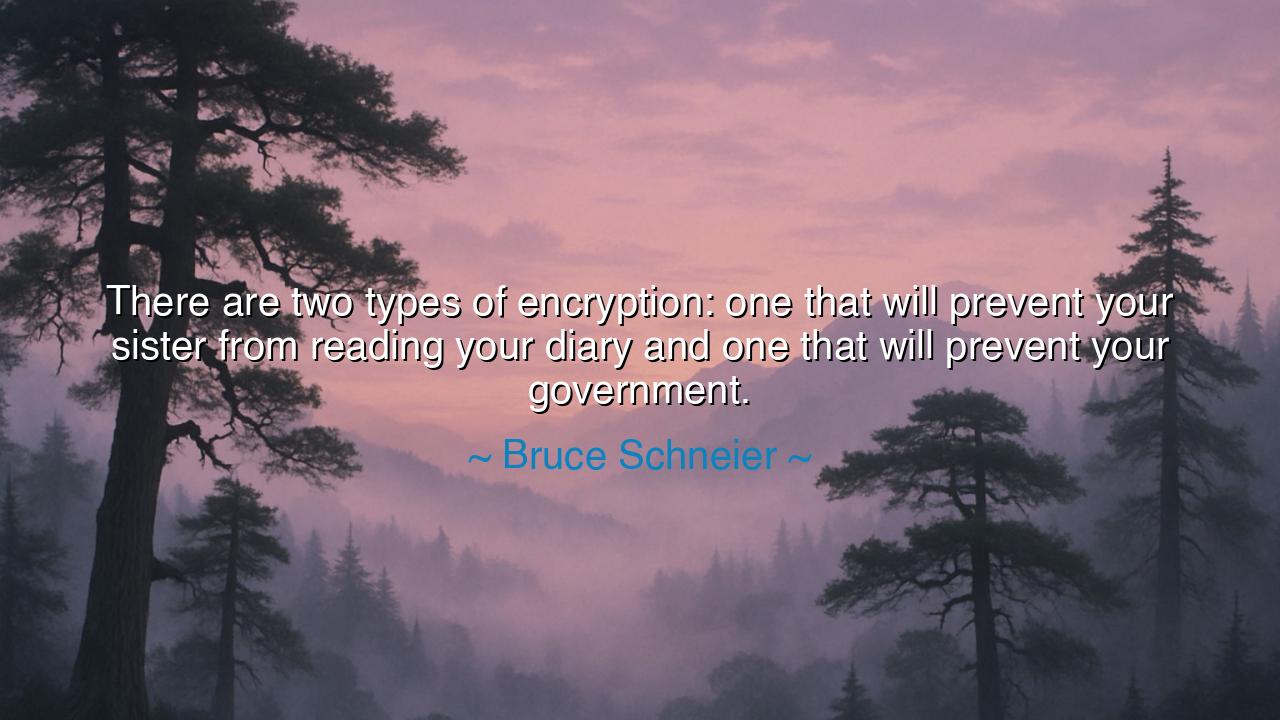
There are two types of encryption: one that will prevent your
There are two types of encryption: one that will prevent your sister from reading your diary and one that will prevent your government.






The cryptographer and philosopher of the digital age, Bruce Schneier, once spoke with piercing clarity about the nature of secrecy in the modern world: “There are two types of encryption: one that will prevent your sister from reading your diary and one that will prevent your government.” In these few words, he reveals a truth as ancient as power itself — that privacy is not merely a technical matter, but a moral frontier between the individual and authority. His statement is both wry and grave, for beneath its humor lies a warning: the difference between trivial secrecy and true freedom is measured by who can — and cannot — break your walls of protection.
To grasp the meaning of this quote, one must understand that encryption — the art of hiding information — is the language of trust in a world of surveillance. When Schneier speaks of “the sister,” he evokes the small, innocent secrets of personal life — the diary, the letter, the private thought meant for no other eyes. This kind of protection is simple, meant to guard embarrassment, not liberty. But the second type — the encryption that can stand against the government — speaks to something far deeper: the defense of one’s dignity and autonomy in the face of immense power. It is the line between privacy as comfort and privacy as resistance, between the harmless and the heroic.
The origin of this truth lies in the dawning of the digital age, when information — once stored in ink and paper — became the blood of civilization, flowing through networks controlled by governments and corporations. Schneier, one of the great architects of modern cryptography, warned that as data became centralized, so too did control. He saw that every citizen’s communications, every confession, every trace of thought could be watched, recorded, and analyzed. In such a world, strong encryption is no longer a convenience — it is the last defense of the free mind. Thus, his words are not technical instruction but a moral pronouncement: freedom depends upon secrecy from power.
History, too, has borne witness to this struggle long before computers. In the Second World War, the Enigma machine used by Nazi Germany encrypted their military communications. The Allies, led by the genius Alan Turing, broke it — and the course of history changed. Yet after victory, the same nations that once celebrated cryptography as salvation grew fearful of it when used by individuals. Governments learned that controlling information meant controlling people. From the censors of empires to the digital spies of modern states, the same desire endures: to see all, know all, and rule through knowledge. Schneier’s distinction — between encryption that keeps out a sibling and encryption that defies a state — is thus the dividing line between innocence and oppression.
The lesson hidden within his words is as profound as it is unsettling. If one lives in a world where privacy is treated as suspicion, then every act of encryption becomes an act of courage. A society that forgets the value of secrecy invites tyranny; a people who surrender their privacy in exchange for comfort awaken one day to find that their thoughts are no longer their own. Schneier reminds us that technology is neither savior nor villain — it is a mirror reflecting the moral will of those who wield it. Freedom requires vigilance, and in the digital age, that vigilance is measured in ciphers and keys.
But the meaning of his quote is not merely political — it is spiritual. For privacy is the sanctuary of the soul. Just as temples and homes were once sacred spaces protected by law and faith, so too must the digital self be shielded by code. To guard one’s data is to guard one’s inner life, one’s dreams, one’s unspoken beliefs. To lose it is to become transparent before power — not in the light of virtue, but in the exposure of vulnerability. Schneier’s words, then, call us to honor the sanctity of our own boundaries, not only for ourselves but for all who will live in this new realm of endless observation.
And so, my child, heed this teaching. Do not treat privacy as a luxury, nor encryption as paranoia. They are the armor of conscience in an age of invisible empires. Use the tools that protect your words, your thoughts, your identity. Demand laws that defend them, and distrust those who seek to weaken them. For a government that fears encryption is one that fears its people, and a people who fear to guard their freedom are already enslaved. Remember Schneier’s wisdom: there are many forms of secrecy, but only one that preserves liberty — the kind that keeps even kings and states from prying into the heart of the individual. Protect that right, and you protect the very essence of what it means to be free.






AAdministratorAdministrator
Welcome, honored guests. Please leave a comment, we will respond soon